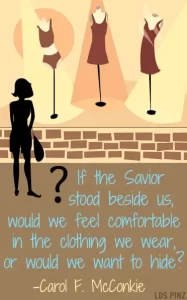Conviction or peer pressure, or just wanting to fit in or obedience to the pastor? It appears most unhealthy churches have a list of standards they impose upon members. While they will tell you that they are founded upon the Bible, there are some who will admit it is up to each pastor to set these rules, whether or not one might find them in the Bible. There can be a lot of pressure upon people to fall in line.
There are those who abide by such standards that will tell you it was God himself who convicted them to follow. Some will say their pastor hardly ever mentions standards, but peer pressure from those around them convinced them to fall in line. Some others, because they believe they must obey what pastor says, adopt the standards though they do not believe God started them. Yet others will change simply because they wish to fit it and not stand apart from the others. There are also some that study and believe that the church is right and that God instructs these rules.
The new person is given some leeway and isn’t expected to incorporate all the standards at first. Yet as they attend more, and especially if they wish to become involved, they start to feel pressed to do so. This pressure could come from one or more sources- the pastor, the other members and themselves. It could be due to a Bible study the church gives. It could be subtle or blatant comments from members. It could even come from strangers online in discussion/debate boards. I don’t know how many times I have seen ministers post online, to those they do not know, and tell them certain standards are necessary or the person will be lost. Just the thought of losing out with God is enough to cause many to become adherents to these standard teachings. Fear can be a great motivator.
One man once wrote regarding standards, “The conservative pastors have little to no tolerance to those that preach a softer message; those pastors don’t even approach their own congregations with humility. It’s their way or the highway.”
I want you to stop and ponder something. Consider what Titus 1 states about elders (NLT): “6 An elder must live a blameless life. He must be faithful to his wife, and his children must be believers who don’t have a reputation for being wild or rebellious. 7 An elder is a manager of God’s household, so he must live a blameless life. He must not be arrogant or quick-tempered; he must not be a heavy drinker, violent, or dishonest with money. 8 Rather, he must enjoy having guests in his home, and he must love what is good. He must live wisely and be just. He must live a devout and disciplined life. 9 He must have a strong belief in the trustworthy message he was taught; then he will be able to encourage others with wholesome teaching and show those who oppose it where they are wrong.”
Does this admonition jive with a pastor who has the attitude of, “It’s my way or the highway?” Does this sound like someone who should demand compliance to whatever they teach?
Need more to convince you? Listen to 1 Timothy 3 (NLT): “This is a trustworthy saying: “If someone aspires to be an elder, he desires an honorable position.” 2 So an elder must be a man whose life is above reproach. He must be faithful to his wife. He must exercise self-control, live wisely, and have a good reputation. He must enjoy having guests in his home, and he must be able to teach. 3 He must not be a heavy drinker or be violent. He must be gentle, not quarrelsome, and not love money. 4 He must manage his own family well, having children who respect and obey him. 5 For if a man cannot manage his own household, how can he take care of God’s church? 6 An elder must not be a new believer, because he might become proud, and the devil would cause him to fall. 7 Also, people outside the church must speak well of him so that he will not be disgraced and fall into the devil’s trap.”
If the pastor of the church you attend is different from what is described above, you need to prayerfully consider if they are someone you should listen to. They may be a self-appointed pastor, concerned with building their own kingdom, instead of someone with the heart of a servant and called by God. If they are adding to the Good News, with lists of demands you must obey, run! Titus states that such “are turning whole families away from the truth by their false teaching.”
********
Shop at our Amazon store! As an Amazon Influencer, this website earns from qualifying purchases.







 Basically the more covered your body is, the better, according to people who believe this.
Basically the more covered your body is, the better, according to people who believe this.



